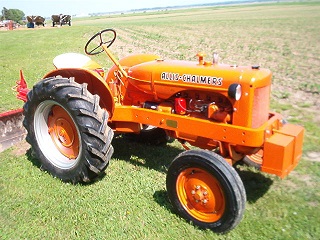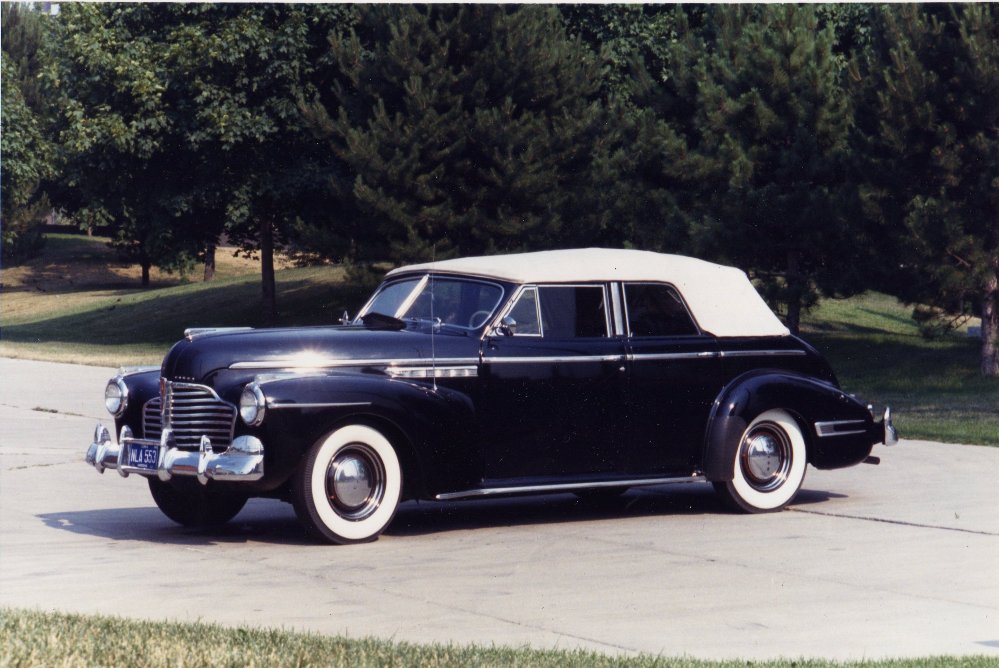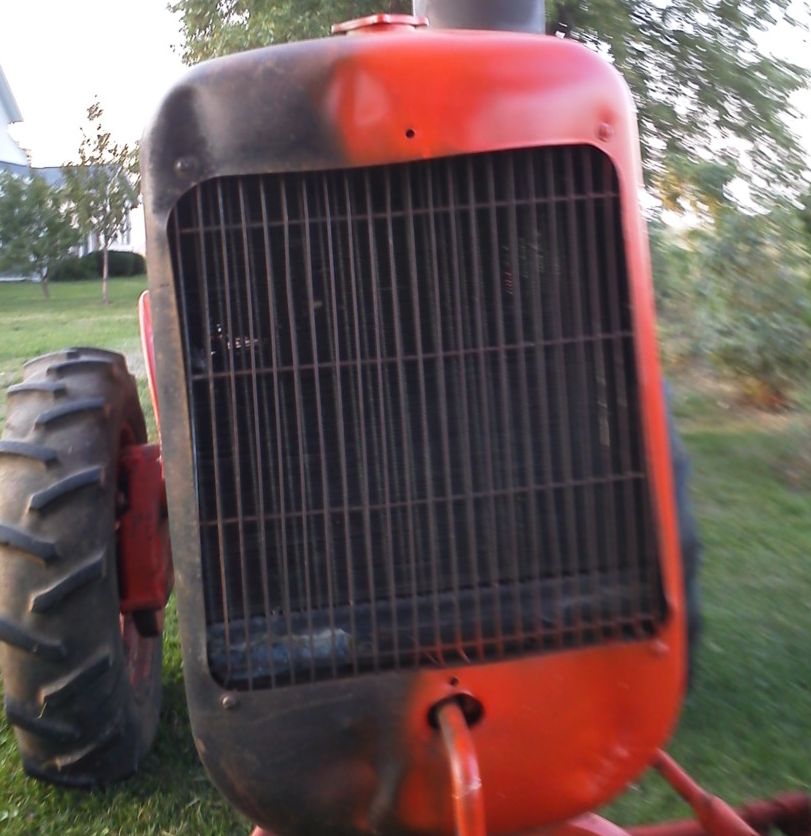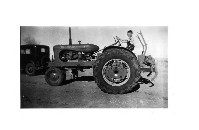| Author |
 Topic Search Topic Search  Topic Options Topic Options
|
soggybottomboy 
Silver Level Access

Joined: 20 Feb 2018
Location: Iowa
Points: 218
|
 Post Options Post Options
 Thanks(0) Thanks(0)
 Quote Quote  Reply Reply
 Topic: Intercoolers Topic: Intercoolers
Posted: 12 Jan 2024 at 10:40am |
Years ago a farmer from the other side of the county had our local dealer put an intercooler on his 8030. I think his 8030 was a stock machine, but i don't know that for sure, and don't know what the horsepower level was on it. I was told that they did a before and after dino test and with the intercooler, the tractor had 2 horsepower less. I always thought that if an engine ran cooler it would be more efficient but it didn't seem to work that way. I have heard that incoming "cool air" can be 300 degrees on these turbocharged engines, and was under the impression that cooling it would result in a power increase without increasing the fuel supply. Apparently not. I have an air to air intercooler from a New Holland Genesis tractor that i could put on my 7045 tractor but why bother if it is not going to help. Maybe an air to air cooler is more efficient than water to air, but i just can't get to excited about doing it if it does'nt do any good? Anybody else done anything like that?
|
 |
|
Sponsored Links
|
|
 |
DrAllis 
Orange Level Access

Joined: 12 Sep 2009
Points: 22140
|
 Post Options Post Options
 Thanks(0) Thanks(0)
 Quote Quote  Reply Reply
 Posted: 12 Jan 2024 at 10:52am Posted: 12 Jan 2024 at 10:52am |
|
Takes fuel to make HP, about 1 gallon per hour burn gets you approx 20 flywheel HP. Intercoolers of any kind pack in more air so you can burn more fuel and meet emissions specs. Intercoolers lower exhaust temps so you can burn more fuel without too high exhaust temps. That's about it.
Edited by DrAllis - 12 Jan 2024 at 10:56am
|
 |
tbran 
Orange Level

Joined: 14 Sep 2009
Location: Paris Tn
Points: 3539
|
 Post Options Post Options
 Thanks(0) Thanks(0)
 Quote Quote  Reply Reply
 Posted: 12 Jan 2024 at 12:21pm Posted: 12 Jan 2024 at 12:21pm |
|
Water coolers are the most efficient - and expensive. Heat 2 pieces of metal and pour water on one and blow air on the other and see which one cools faster. Ford once had a twin turbo engine that used the air from one turbo to blow air through the air to air intercooler. As the good Doc stated it takes fuel to make hp - the intercooler allows more HP to be made w/o sacrificing engine life due to increased combustion temps. Also remember that putting on an intercooler will transfer that 300 degree air temp INTO the tractors cooling system sometimes causing heating issues. All the radiators on 7000 series and 8000 series are the same size (some early 7000 were different) but have more (thicker) rows of flues to handle the increased temps. As to 'losing hp' I would suspect different temps or some other influence - the intercooler should not have had any affect on HP. IF the fuel was turned up the engine should have gained hp with the addition. I have always questioned the water flow/efficiency of the AC factory intercooler. On some of the ones we installer we added a cooler attached to the front grill - ran water from it to the cooler thru a plate we made that was from a rear cap that has a divider in it and tapped two 1/2 pipe holes for inlet and outlet - the other end was stock end cap. The water goes in the bottom side , goes thru the cooler and up and out the top side or vice versa. There was a bulletin a long time ago that some intercoolers were installed 90 degrees in the housing which virtually negated the effectiveness. Just a long ramble on a rainy day before the temps plunge.
Edited by tbran - 12 Jan 2024 at 12:34pm
|
|
When told "it's not the money,it's the principle", remember, it's always the money..
|
 |
RedHeeler79 
Silver Level

Joined: 09 Sep 2023
Location: NE Kansas
Points: 204
|
 Post Options Post Options
 Thanks(0) Thanks(0)
 Quote Quote  Reply Reply
 Posted: 12 Jan 2024 at 12:24pm Posted: 12 Jan 2024 at 12:24pm |
|
If the CAC that they installed was used, and had a crack in the core that they didn’t notice, or piping / rubber boots weren’t installed correctly, it may have had a boost leak that went undetected and caused a lower hp number in the dyno afterwards. If the machine didn’t have a manifold pressure guage or another way of measuring boost, could have gone unnoticed…, I would think adding a CAC would help and certainly not hurt, but maybe it just needed a little more fuel afterwards, like Dr Allis pointed out…
Was it a water cooled aftercoolernor an air to air type?
Edited by RedHeeler79 - 12 Jan 2024 at 12:28pm
|
 |
steve(ill) 
Orange Level Access


Joined: 11 Sep 2009
Location: illinois
Points: 88509
|
 Post Options Post Options
 Thanks(0) Thanks(0)
 Quote Quote  Reply Reply
 Posted: 12 Jan 2024 at 12:33pm Posted: 12 Jan 2024 at 12:33pm |
|
DR is right.... We had 21000 engines in the 21C dozers at 325 HP with a turbo.... Put an intercooler on it and you could CRANK UP THE FUEL PUMP due to the extra air available... That made 375 HP for the 945 wheel loaders (25000 engine)... If you just cranked up the pump on the 21000 it would get excessive HOT and also more black smoke.
|
|
Like them all, but love the "B"s.
|
 |
Lynn Marshall 
Orange Level Access


Joined: 13 Sep 2009
Location: Dana, Iowa
Points: 2425
|
 Post Options Post Options
 Thanks(0) Thanks(0)
 Quote Quote  Reply Reply
 Posted: 12 Jan 2024 at 12:37pm Posted: 12 Jan 2024 at 12:37pm |
|
Two horsepower difference isn't even worth mentioning. Outside air temperatures on two different days can change readings on a dyno.
|
 |
steve(ill) 
Orange Level Access


Joined: 11 Sep 2009
Location: illinois
Points: 88509
|
 Post Options Post Options
 Thanks(0) Thanks(0)
 Quote Quote  Reply Reply
 Posted: 12 Jan 2024 at 12:38pm Posted: 12 Jan 2024 at 12:38pm |
internet...
When the air is compressed by a turbo/supercharger, it gets hot very quickly. Therefore, its temperature climbs and its oxygen content (density) drops. When the air is cool, an intercooler provides a denser, more oxygen-rich air to the engine. Therefore, improving the combustion by allowing more fuel to be burned. It also increases reliability as it provides a more consistent temperature of air intake to the engine. This allows the air-fuel ratio of the engine to remain at a safe level. |
|
Like them all, but love the "B"s.
|
 |
soggybottomboy 
Silver Level Access

Joined: 20 Feb 2018
Location: Iowa
Points: 218
|
 Post Options Post Options
 Thanks(0) Thanks(0)
 Quote Quote  Reply Reply
 Posted: 12 Jan 2024 at 12:39pm Posted: 12 Jan 2024 at 12:39pm |
|
The dealer told me a person was better off just leaving the factory's work alone. I don't need more power out of the 45 since I have bigger tractors, but I always like to make improvements. Maybe this isn't.
|
 |
soggybottomboy 
Silver Level Access

Joined: 20 Feb 2018
Location: Iowa
Points: 218
|
 Post Options Post Options
 Thanks(0) Thanks(0)
 Quote Quote  Reply Reply
 Posted: 12 Jan 2024 at 12:43pm Posted: 12 Jan 2024 at 12:43pm |
|
Oh yes, it was a water cooled cooler.
|
 |
Lynn Marshall 
Orange Level Access


Joined: 13 Sep 2009
Location: Dana, Iowa
Points: 2425
|
 Post Options Post Options
 Thanks(0) Thanks(0)
 Quote Quote  Reply Reply
 Posted: 12 Jan 2024 at 12:48pm Posted: 12 Jan 2024 at 12:48pm |
|
An intercooler on a 7045 won't really help it's performance without turning up the fuel. I've always felt that the radiator on a 7045 was marginal at best. More horsepower may require a larger radiator.
|
 |
DrAllis 
Orange Level Access

Joined: 12 Sep 2009
Points: 22140
|
 Post Options Post Options
 Thanks(0) Thanks(0)
 Quote Quote  Reply Reply
 Posted: 12 Jan 2024 at 1:21pm Posted: 12 Jan 2024 at 1:21pm |
|
7045 radiator has 4 rows of tubes. 7060 has 5 rows of tubes for 20%+ more cooling capacity. 8030/8050 have same radiator size.
|
 |
bigal121892 
Orange Level

Joined: 05 Jan 2010
Location: Nebraska
Points: 815
|
 Post Options Post Options
 Thanks(0) Thanks(0)
 Quote Quote  Reply Reply
 Posted: 12 Jan 2024 at 4:00pm Posted: 12 Jan 2024 at 4:00pm |
|
We added an intercooler to a 7010, didn't make any difference, until the injection pump was reworked to 7020 specs. Next problem was the transmission. Adding an intercooler to a 7045, or an 8030 with the pump setup for more fuel, will get more horsepower, but will the drive train be able to handle it.
|
 |
DrAllis 
Orange Level Access

Joined: 12 Sep 2009
Points: 22140
|
 Post Options Post Options
 Thanks(0) Thanks(0)
 Quote Quote  Reply Reply
 Posted: 12 Jan 2024 at 5:20pm Posted: 12 Jan 2024 at 5:20pm |
|
7045 and 7060 are thee exact same driveline. 8030 has 2-pinion differential and lighter final drives. Same size equipment a gear faster and that driveline will be OK fine.
|
 |
Unit3 
Orange Level


Joined: 17 Oct 2009
Location: NC Iowa
Points: 5605
|
 Post Options Post Options
 Thanks(0) Thanks(0)
 Quote Quote  Reply Reply
 Posted: 12 Jan 2024 at 7:34pm Posted: 12 Jan 2024 at 7:34pm |
|
I had my 7045 rebuilt years ago with M&W pistons and I had an intercooler added to it at that time. It makes right around 160 horse on the Dino. Dr. Allis would know more than me, but doesn’t the 7045 have more fan blades? Cooling has never been a problem for me.
|
|
2-8070FWA PS/8050PS/7080/7045PS/200/D15-II/2-WD45/WD/3-WC/UC/C
|
 |
soggybottomboy 
Silver Level Access

Joined: 20 Feb 2018
Location: Iowa
Points: 218
|
 Post Options Post Options
 Thanks(0) Thanks(0)
 Quote Quote  Reply Reply
 Posted: 12 Jan 2024 at 8:51pm Posted: 12 Jan 2024 at 8:51pm |
|
The 7060 was more efficient in the Nebraska tractor test than the 7045. The 7020 was more efficient than the 7010. I always thought that was the result of cooler air, but maybe it is the result of cooler air with more fuel that drives that efficiency.
|
 |
DaveKamp 
Orange Level Access


Joined: 12 Apr 2010
Location: LeClaire, Ia
Points: 6089
|
 Post Options Post Options
 Thanks(0) Thanks(0)
 Quote Quote  Reply Reply
 Posted: 13 Jan 2024 at 12:06am Posted: 13 Jan 2024 at 12:06am |
The intercooler's purpose is to reduce the temperature of recently-compressed air.
Regardless of the case, the presence of ANY compressor will result in the air temperature rising. Even without an OUNCE of boost, the heat that comes through the housing (particularly in a turbo) and the heat resulting from violent thrashing, is put into the air... but compressing packs more air in a small space, and all the latent heat IN that air becomes concentrated, thus, the effective TEMPERATURE of the incoming air is higher. Now, we don't have to worry about DENSITY of the charge, because the COMRPESSOR is increasing the density... but the empirical result of Combined Gas Law is that compressed gasses experience temperature rise, because all the latent heat in the air BEFORE compression, is now packed into a much smaller area, so the thermometer will indicate much HIGHER temp.
In a gasoline engine, the intercooler's greatest benefit, is that since the incoming charge is COOLER, it will be less likely for the engine to exhibit PREIGNITION. Even if there's darned near NO fuel in the cylinder, all that heat will cause the charge to ignite WAY too early, which means you're gonna LOSE power (at least, until you burn a hole through a piston, right?)
IN a DIESEL engine, the same applies... but wait... the diesel is a COMPRESSION IGNITION engine, so there's no spark plug 'hot spot' to worry about with preignition, right? OF course, but can a diesel 'preignite'? Not if there's no fuel... if there's enough oil blowby though... it CAN preignite.
So what's this mean with respect to horsepower? As Doc noted, you can cram all the air in you want... it will only burn as much fuel as you feed it, and your power output is entirely dependant upon your fuel burn rate. This means that it doesn't matter if you go from 12 pounds of boost, to 30 pounds, to 130 pounds, if you don't increase the fuel flow, the boost will simply be a waste of time.
And the converse is true- IF you look and see black smoke coming out the pipe, you're not getting good burn, and one of the FIRST things that cause that... is overfueling. When you see black soot, you can throw all the FUEL you want in there, it will NOT give you any more power, because there's simply NO OXYGEN LEFT to burn that fuel... it's goin' up as a dark cloud... money thrown away...
If you cram more air in there... that stuff will burn, the pipe's discharge cleans up, and you get more effective cylinder pressure.
Back to the intercooler...
Internal combustion reciprocating piston engines are HEAT-INTO PRESSURE devices. When you burn a mix of fuel and air in a small space, the heat causes gases to expand, exerting pressure. The more fuel and air you can pack in, the greater the pressure...
But the piston and cylinder work on a basic physics principle:
The cylinder fires at one temperature, and the temp increases, forcing gas pressure up, and the rod and crank turn that into rotating kinetic energy.
It is the DIFFERENCE in pressure that makes the engine RUN. Start at a low pressure, close the valves, and change it to a HIGH pressure.
Obviously, if the intake charge is at 2700F, and the burned fuel charge is 2700F, you're not gonna make much power, right?
That intake example is pretty extreme, but let's say it's oh... 400F, and finishes at 2400F? Well, the total differential pressure is significantly HIGHER, so your output power will be much higher.
|
|
Ten Amendments, Ten Commandments, and one Golden Rule solve most every problem. Citrus hand-cleaner with Pumice does the rest.
|
 |
gleaner1 
Silver Level


Joined: 17 Dec 2009
Points: 225
|
 Post Options Post Options
 Thanks(0) Thanks(0)
 Quote Quote  Reply Reply
 Posted: 13 Jan 2024 at 8:49am Posted: 13 Jan 2024 at 8:49am |
|
Very interesting topic.
Ive always questioned the water to air coolers, vs air to air.
Ambient air plays such a huge
part.
Running in arizona in july the water version is probably the way to go.
But say running northern canada late fall one would think that cooling the intake air with 32 degree ambient is better than 180 degree coolant.
|
|
ALLIS CHALMERS "The color is orange"
|
 |
8070nc 
Orange Level Access

Joined: 21 Mar 2019
Location: North Carolina
Points: 646
|
 Post Options Post Options
 Thanks(0) Thanks(0)
 Quote Quote  Reply Reply
 Posted: 13 Jan 2024 at 9:29am Posted: 13 Jan 2024 at 9:29am |
|
Seems to me performance would be more consistant with water to air. Air to air would see inlet temps all over the place in the course of a year. And they look cool on the engine. I know this is testosterone speaking but when I see that intercooler on an engine Im thinking its saying Im serious Im ready lets go pull something
|
|
1984 80780
1957 D14
DES 300 with 25000 engine
616 tractor
|
 |
Michael V (NM) 
Orange Level Access


Joined: 12 Sep 2009
Location: NM
Points: 2492
|
 Post Options Post Options
 Thanks(0) Thanks(0)
 Quote Quote  Reply Reply
 Posted: 13 Jan 2024 at 1:21pm Posted: 13 Jan 2024 at 1:21pm |
|
there must be something with the ATAAC engines, that about all that is on any mobile equipment now days,, so,, WJAC must be a thing of the past, or limited to specific applications?
|
 |
8070nc 
Orange Level Access

Joined: 21 Mar 2019
Location: North Carolina
Points: 646
|
 Post Options Post Options
 Thanks(0) Thanks(0)
 Quote Quote  Reply Reply
 Posted: 13 Jan 2024 at 2:00pm Posted: 13 Jan 2024 at 2:00pm |
|
Probably because its cheaper
|
|
1984 80780
1957 D14
DES 300 with 25000 engine
616 tractor
|
 |









 Topic Options
Topic Options

 Post Options
Post Options Thanks(0)
Thanks(0)






